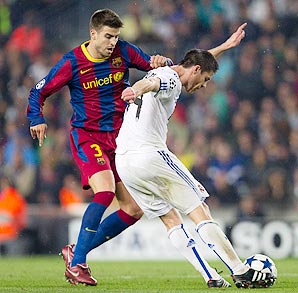Infighting, fatigue could hurt Spanish team's chances at Euro '12
The world champions caught a plane at Barajas airport on Wednesday afternoon. Their destination: Boston and friendly matches with the United States and Venezuela. The first of those games has been billed -- insomuch as it has been billed at all, slipping below summer transfers in the media pecking order -- as the chance to settle a score.
The U.S., after all, is the only team to have denied Spain a trophy in the last three years. The Americans defeated the 2008 European champions and 2010 World Cup winners in the semifinals of the 2009 Confederations Cup. And not only did that deny Spain the trophy, it also denied them chance to defeat Brazil -- at the time, the only opponents against whom they could really be judged.
Now, la selección have the opportunity for vengeance. Except that the truth is few are really talking about that; the 2010 World Cup washed clear any feeling of failure or thirst for revenge.
Xabi Alonso admitted that he could not sleep, Gerard Piqué too. But it wasn't American forwards keeping them awake, it was jet lag. Other issues occupy Spanish minds. Like the generational shift coach Vicente del Bosque believes will be necessary for the European Championships and, more importantly, afterward; and like the relationship between players.
The greatest obsession for the media and supporters has been this relationship between Madrid and Barcelona players after the intense, angry and often downright nasty series of clásicos between the teams in April and May -- four often brutal and bad-tempered games in just eighteen days. Del Bosque admitted at the time that he was concerned, as the mutual accusations and confrontations kept on coming and the issue has become a live one again this week.
Publicly, Del Bosque was quick to dismiss suggestions of division but he did fire a warning just in case. He also reminded his players of a code of behavior and the fact that he can always punish players if needs be.
"We have all done something ugly in our time," he said, "whoever is free of sin, let him cast the first stone. After the storm, there is always calm. But we will be ready if anything happens."
Few expected anything to actually happen, but this week Spain's players met up for the first time since those games and there was a slightly different feel about Las Rozas, the federation's HQ.
According to El País, one member of Del Bosque's staff admitted that "things will get back to normal soon, but the truth is that the atmosphere is a bit strange right now." Another described it as "cold." And as one player departed, he was asked privately: "So, all friends again now?" The response? Rolled eyes and a shrug of the shoulders.
The good news -- and this is the spin the coaching staff are putting on the trip -- is that a long flight and a few days together might be the best means of healing old wounds. By bringing players together in an environment in which, this time, they are on the same side, you create the conditions for them to get along once more. In fact, you force them to.
Perhaps so, but for most players this feels more like an inconvenience than an opportunity. It is an imposition that, in many cases, the players resent. The fact that they are here at all is the issue that most occupies them. The mentality is hardly positive. After a long season and a clásico series that players on both sides privately hated, they just wanted to get away. Some had done so, only to have to report back once more. Del Bosque has talked about the "responsibility" of being world champions and the importance of not losing the prestige gained last summer, but most players do not agree.
For them, this is simply a game too far.
If anyone doubts the lack of enthusiasm Spain's players have for these trips, they need only see the results when they traveled to Mexico and Argentina last year. Or even Portugal. Better still, hear them out as they prepared to fly this week. "They're trying to kill us," one said. Another described it as a "disgrace". They are used to being a traveling circus: the Spanish Federation takes the national team around grounds all over Spain, some of them startling small for the world champions, and invariably at 10 o'clock at night. That creates a wonderful carnival atmosphere for fans but it is not always conducive to players' comfort.
The players are not stupid: They are aware that, in part, they are a traveling circus, making money and currying political favors for the federation and its president, Ángel María Villar. But this still feels like an imposition.
"Sure," one player responds when told to be realistic and to consider the bigger picture, to accept the inevitability of Spain filling FIFA dates with fixtures, "but couldn't we have gone and made money in Europe? Couldn't we have played a friendly against England or Holland or France?"
Nor is that a point made entirely out of selfishness. Some fear that the imposition is one that they may pay for next summer, when the games really do matter. Spain has traveled in each of the last three summers; many feel like they are on a treadmill, never given the chance to step off. This was an opportunity for the Spanish Football Federation to give their players a break before they attempt to become the first national team in history to win three competitions in a row. It is an opportunity they have missed.
After Spain won the World Cup to go with their European Championship victory two years earlier, many sought a catchall explanation. What, they asked, has the Federation done to make la selección so successful? The answer, as this week has again hinted, is simple: nothing.





